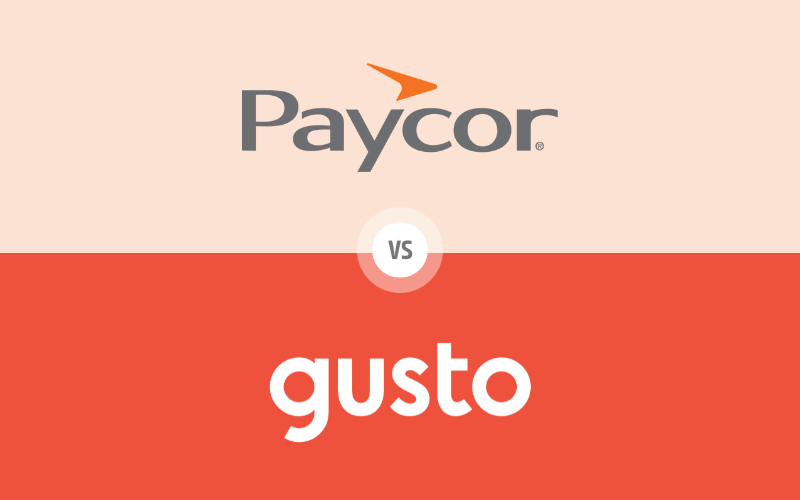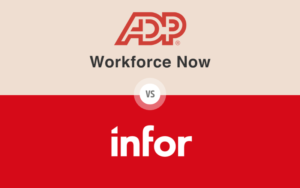Choosing the right Human Capital Management (HCM) system for your business can be a daunting task. In this blog post, we delve into a detailed comparison of Paycor vs Gusto, two prominent players in the HCM landscape. By examining various aspects such as user interface, core HR functions, payroll management, and more, we aim to provide insights that help you determine which system best fits your organizational needs. Whether you’re a small business looking for user-friendly solutions or a larger enterprise in need of robust HR functionalities, this comparison will guide you through the essential features and capabilities of both Paycor and Gusto.
Table of Contents
User Interface and User Experience
When evaluating HCM solutions, particularly in a comparison like Paycor vs Gusto, the user interface (UI) and user experience (UX) are pivotal. Both platforms are engineered to simplify HR processes with their distinct design philosophies.

Paycor User Interface and User Experience
Paycor stands out with its modern, intuitive interface that prioritizes user-friendliness. The dashboard is cleanly organized, allowing users to navigate through a variety of features effortlessly. The layout’s high customizability empowers HR teams to adapt the interface to meet specific operational demands.
Key Features of Paycor UI/UX:
- Customization: The dashboard can be personalized with widgets and shortcuts to frequently used functions, significantly enhancing workflow efficiency.
- Visual Design: The interface uses a professional color palette and clear visuals to ensure a pleasant user experience.
- Ease of Use: Paycor is designed to be intuitive, helping to reduce the learning curve for new users and decrease the need for extensive training.
Gusto User Interface and User Experience
In contrast, Gusto adopts a more streamlined approach that emphasizes functionality and ease of use, ideal for smaller businesses or those valuing a quick setup. Its straightforward interface supports essential HR tasks effectively without overwhelming users with complexity.
Key Features of Gusto UI/UX:
- Functionality: Provides essential features needed for effective HR management without over-complication.
- Navigation: The layout is logically organized to help users quickly find necessary tools and information.
- Modern Design: Gusto’s design is modern and user-centric, focusing on usability with a minimalist aesthetic to enhance engagement.
Comparison and Conclusion
The choice between Paycor and Gusto hinges on the specific UI and UX needs of your organization. Paycor offers a robust, highly customizable interface suited for larger companies or those with complex HR requirements. Its adaptable platform is capable of supporting intricate workflows and detailed management tasks, making it ideal for organizations that foresee growth or have a diverse set of HR functionalities to manage.
Gusto, meanwhile, serves best those looking for simplicity and efficiency. Its user-friendly design ensures that small to medium-sized businesses can implement and use the platform with minimal training. Gusto’s focus on the essentials makes it suitable for companies that prioritize a straightforward approach and may not require the breadth of customization that Paycor offers.
Ultimately, your decision should be influenced by the scale of your operations and the depth of functionality required. For businesses needing a detailed, adaptable system that can grow and evolve, Paycor is the preferred choice. For those who need an efficient, easy-to-use system that handles fundamental HR tasks with ease, Gusto is the better fit. Both platforms offer distinct advantages, and the right choice will align with your organization’s specific requirements and long-term HR management strategy.
Core HR Functions
When assessing the capabilities of HR management platforms, understanding the core HR functions they offer is essential. This comparison between Paycor vs Gusto delves into how each platform supports fundamental HR tasks, critical for managing employee information and automating HR operations effectively.

Paycor Core HR Functions
Paycor provides a comprehensive suite of core HR functions designed to support large and medium-sized businesses with complex HR needs. The platform excels in offering a broad range of features that facilitate the management of employee records, benefits administration, and compliance tracking.
Key Features of Paycor Core HR Functions:
- Employee Self-Service: Paycor enables employees to access and manage their personal data and HR documents, which reduces HR staff workload and improves data accuracy.
- HR Compliance: The system includes features that help organizations stay compliant with labor laws and regulations, featuring automatic updates to keep track of changes in legislation.
- Benefits Administration: Paycor offers an integrated benefits administration module that simplifies the management of employee benefits, including health insurance, retirement plans, and other perks.
Gusto Core HR Functions
Gusto is particularly well-regarded among small to medium-sized businesses for its user-friendly and straightforward approach to core HR functions. It simplifies many of the essential HR tasks, making it accessible for businesses without a dedicated HR department.
Key Features of Gusto Core HR Functions:
- Automated Payroll: Gusto provides a highly automated payroll system that integrates with time tracking and compensation management, reducing the complexity and potential errors in payroll processing.
- Employee Onboarding: Gusto streamlines the onboarding process with digital checklists and automated task assignments, making it easy for new hires to integrate into the company.
- Health Benefits and Workers’ Compensation: Even though it’s geared towards smaller companies, Gusto offers robust options for managing health benefits and workers’ compensation plans directly through the platform.
Comparison and Conclusion
The decision between Paycor and Gusto in terms of core HR functions will largely depend on the size of your business and the complexity of your HR requirements.
Paycor is better suited for larger organizations that need a detailed, customizable system capable of managing a wide array of HR tasks. Its comprehensive features support extensive HR functions, from recruitment to retirement, making it an excellent choice for businesses that require a holistic approach to HR management.
Gusto, on the other hand, offers a more streamlined, easy-to-use system that excels in fundamental HR functions with minimal setup. It is ideal for smaller businesses or those with straightforward HR needs. Gusto’s focus on automation and simplicity helps smaller companies manage HR functions efficiently without the overhead of more complex systems.
In summary, if your business requires a robust, feature-rich platform that can handle complex HR functions and provide extensive customization, Paycor is the preferred option. If you need a straightforward, efficient system that covers basic HR needs with ease, Gusto should be your choice. Both platforms cater to different business needs, ensuring that you can select the best option based on your specific requirements and operational scale.
Payroll Management
In the world of Human Capital Management (HCM) software, payroll management is a critical function that significantly affects the efficiency of business operations. This section provides a detailed comparison of payroll management capabilities between Paycor vs Gusto, highlighting how each platform can meet different business needs.

Paycor Payroll Management
Paycor’s payroll system is designed for adaptability and precision, catering especially to medium and large-sized businesses that require robust payroll solutions. Paycor focuses on comprehensive features that manage complex payroll needs seamlessly.
Key Features of Paycor Payroll Management:
- Customizable Pay Rules: Paycor allows for extensive customization of pay rules to accommodate diverse employment agreements, union rules, and compliance requirements, ensuring that payroll is processed accurately according to specific business policies.
- Tax Compliance: The platform provides automatic tax calculations and filings, reducing the burden of staying up-to-date with federal, state, and local tax regulations.
- Integrated Time Tracking: Paycor integrates payroll with time and attendance tracking, which minimizes errors and streamlines the process from timekeeping to paycheck.
Gusto Payroll Management
Gusto is well-suited for small to medium-sized businesses, offering a user-friendly and straightforward payroll system. Its focus is on simplifying payroll processes to make them as efficient and error-free as possible for businesses with less complex needs.
Key Features of Gusto Payroll Management:
- Automated Payroll: Gusto automates the entire payroll process, including tax calculations and filings, ensuring that employees are paid accurately and on time with minimal input required from administrators.
- Employee Self-Service: Employees can access their pay stubs and tax documents through a secure online portal, which not only empowers employees but also reduces administrative workload.
- Benefits Integration: Gusto uniquely integrates payroll with benefits management, allowing for deductions and contributions to be handled automatically, which simplifies the administration of health insurance and retirement plans.
Comparison and Conclusion
When deciding between Paycor and Gusto for payroll management, consider the scale of your operations and the complexity of your payroll needs.
Paycor is ideal for organizations that face complex payroll challenges, such as managing multiple pay rates, benefits deductions, and compliance with various tax jurisdictions. Its robust feature set and customizable nature make it capable of handling intricate payroll requirements efficiently, which is perfect for larger companies or those with specialized needs.
Gusto, on the other hand, is excellent for smaller businesses looking for ease and simplicity in their payroll processes. It reduces the time spent on payroll management with its automated systems and easy-to-use interface, making it a strong candidate for businesses that value straightforward, effective solutions without the need for extensive customization.
Ultimately, your choice between Paycor and Gusto should align with your business’s specific needs. For complex, customizable payroll solutions, Paycor is the better fit. For streamlined, efficient payroll processing, Gusto will likely serve your needs more effectively.
Time and Attendance Tracking
Effective time and attendance tracking is essential for managing a workforce efficiently, ensuring accurate payroll processing, and complying with labor laws. This comparison between Paycor vs Gusto evaluates how each platform supports businesses in monitoring and managing employee attendance and work hours.

Paycor Time and Attendance Tracking
Paycor offers a comprehensive time and attendance system designed to accommodate the needs of medium to large-sized businesses with complex scheduling and compliance requirements.
Key Features of Paycor Time and Attendance Tracking:
- Advanced Scheduling: Paycor provides tools for creating and managing employee schedules, including shift swaps and overtime management, which are crucial for businesses with variable workforce needs.
- Real-Time Data: The system offers real-time attendance tracking, which helps managers monitor tardiness, absences, and overtime, enabling proactive management of workforce issues.
- Integration with Payroll: Paycor’s time tracking is fully integrated with its payroll system, ensuring that hours worked are automatically reflected in payroll calculations, which minimizes errors and administrative overhead.
Gusto Time and Attendance Tracking
Gusto’s time and attendance features are tailored for small to medium-sized businesses, offering a straightforward and intuitive solution that simplifies the tracking process.
Key Features of Gusto Time and Attendance Tracking:
- Simple Time Tracking: Gusto provides an easy-to-use time tracking system that employees can access through a web or mobile app, making it convenient to clock in and out while providing managers real-time access to attendance data.
- Automated Alerts: The platform can send automatic notifications to managers about late clock-ins or when employees are nearing overtime, helping to manage labor costs and ensure compliance with work hour regulations.
- Seamless Integration: Like Paycor, Gusto integrates time tracking with payroll, which ensures that the hours recorded are directly used for payroll processing, reducing discrepancies and the effort required for payroll preparation.
Comparison and Conclusion
Choosing between Paycor and Gusto for time and attendance tracking should be based on your business size and the complexity of your workforce management needs.
Paycor is well-suited for organizations that require robust scheduling capabilities and detailed tracking to handle a large or complex workforce. Its extensive features support a range of industries and can accommodate businesses with specific compliance requirements.
Gusto, on the other hand, is ideal for smaller businesses that need a more basic, user-friendly time tracking system. It offers essential features that are easy to implement and manage, making it a great option for companies without the resources to manage a complex system.
In summary, if your organization needs a powerful, customizable solution capable of handling complex scheduling and compliance challenges, Paycor is likely the better choice. For smaller businesses looking for simplicity and efficiency in their time tracking system, Gusto provides an effective and straightforward solution. Your decision will depend on the scale of your operations and the specific challenges you face in managing time and attendance.
Benefits Administration
Benefits administration is a key component of Human Capital Management (HCM) systems, as it involves managing and organizing employee benefits like health insurance, retirement plans, and other perks. This comparison between Paycor vs Gusto focuses on how each platform handles benefits administration, aiding businesses in making informed choices for their HR needs.

Paycor Benefits Administration
Paycor is equipped with a robust benefits administration module that serves well for medium to large-sized businesses with diverse benefits needs and complex compliance requirements.
Key Features of Paycor Benefits Administration:
- Comprehensive Coverage Options: Paycor supports a wide array of benefits plans, including health, dental, vision, life insurance, and retirement plans, providing businesses the flexibility to offer a variety of benefits suited to their workforce.
- Employee Self-Service Portal: Employees can manage their benefits selections directly through Paycor’s portal, which enhances transparency and reduces administrative workload by allowing employees to handle enrollments, changes, and reviews independently.
- Regulatory Compliance: The system is designed to help businesses comply with federal and state regulations, such as ACA and ERISA, by automating compliance tasks and ensuring that reporting and employee notices are handled correctly.
Gusto Benefits Administration
Gusto excels in providing a user-friendly benefits administration experience that is ideal for small to medium-sized businesses, focusing on ease of use and seamless integration with other HR functions.
Key Features of Gusto Benefits Administration:
- Integrated Benefits System: Gusto offers a streamlined approach to benefits management by integrating it closely with payroll, ensuring that deductions and contributions are accurately reflected and managed without manual intervention.
- Automatic Compliance: Gusto automates several compliance aspects, including tax-advantaged benefits and state-specific rules, reducing the burden of regulatory compliance on businesses.
- Employee Access and Education: Gusto provides employees with an intuitive interface to view and select benefits, along with educational resources to help them make informed decisions about their options.
Comparison and Conclusion
When deciding between Paycor and Gusto for benefits administration, the size of your business and the complexity of your benefits needs are significant factors.
Paycor offers a more detailed and customizable solution that can accommodate a larger variety of benefit options and complex compliance scenarios. It is particularly suitable for larger businesses or those with specific requirements that may vary significantly from one employee group to another.
Gusto, meanwhile, is very effective for smaller businesses or those that prefer a straightforward, integrated solution that can be managed with minimal HR expertise. Gusto simplifies the administration process and makes it easier for businesses without a dedicated benefits specialist to offer competitive benefits packages.
Ultimately, if your organization requires advanced benefits management with extensive customization and compliance capabilities, Paycor is the recommended choice. If simplicity and integrated functionality are prioritized, Gusto offers an excellent platform that meets the needs of smaller operations efficiently. Your choice should align with your organization’s size, the complexity of benefits management required, and the resources available to manage this HR function.
Performance Management
Performance management is a vital function within Human Capital Management (HCM) systems, focusing on assessing and enhancing employee performance through feedback, goal-setting, and development plans. This section explores how Paycor vs Gusto handles performance management features, offering insights into which system might be more suitable for different types of businesses.

Paycor Performance Management
Paycor’s performance management system is robust, designed to cater to the needs of medium to large-sized businesses that require comprehensive tools to effectively monitor and improve employee performance.
Key Features of Paycor Performance Management:
- Goal Setting and Tracking: Paycor allows managers and employees to set and track goals, aligning individual objectives with business strategies, which helps in driving accountability and performance.
- 360-Degree Feedback: The platform supports 360-degree feedback, enabling evaluations from multiple sources, including peers, subordinates, and managers, to provide a well-rounded view of employee performance.
- Development Plans: Paycor facilitates the creation of personalized development plans for employees, helping them improve skills that are crucial for their roles and future growth within the company.
Gusto Performance Management
Gusto offers a simpler, more streamlined performance management system that is suitable for small to medium-sized businesses. Its focus is on providing basic tools that are easy to use and integrate seamlessly with other HR functions.
Key Features of Gusto Performance Management:
- Simplified Performance Reviews: Gusto simplifies the performance review process, making it accessible and manageable for smaller companies without dedicated HR departments.
- Feedback Tools: The system includes straightforward feedback tools that allow for regular communication between managers and employees, fostering a culture of continuous improvement.
- Integrated Recognition: Gusto incorporates recognition features that enable managers and peers to acknowledge and reward employees directly through the platform, enhancing engagement and motivation.
Comparison and Conclusion
The decision between Paycor and Gusto for performance management should be based on the complexity of your performance evaluation needs and the size of your organization.
Paycor is ideal for organizations that need a detailed and extensive approach to performance management, with advanced features like 360-degree feedback and individual development plans. This makes it suitable for larger companies or those that prioritize a detailed assessment of employee performance as part of their talent management strategy.
Gusto, on the other hand, is well-suited for smaller businesses looking for a straightforward and efficient way to manage performance reviews. Its ease of use and integration with other HR functions make it a great choice for companies with simpler needs or those new to structured performance management.
In summary, if your business requires a comprehensive, feature-rich performance management system to handle complex evaluations, Paycor is the preferred choice. For businesses seeking an easy-to-use system that covers the essentials of performance reviews and feedback, Gusto provides an effective solution. Your choice will ultimately depend on your business’s specific needs, the scale of your operations, and how integral performance management is to your HR strategy.
Talent Management and Recruiting
Talent management and recruiting are key functionalities of Human Capital Management (HCM) systems, focusing on attracting, hiring, and retaining the best employees. This section compares Paycor vs Gusto in terms of their capabilities in these critical areas, helping businesses understand which platform might better suit their needs.

Paycor Talent Management and Recruiting
Paycor offers a robust set of features for talent management and recruiting, designed to support medium to large-sized businesses with complex hiring requirements.
Key Features of Paycor Talent Management and Recruiting:
- Comprehensive Recruiting Tools: Paycor provides a suite of recruiting tools that include applicant tracking systems (ATS), onboarding solutions, and background check integrations, streamlining the entire hiring process from start to finish.
- Career Development: The platform offers extensive career development tools to support employee growth within the organization, such as succession planning and career pathing, which help align employee goals with organizational needs.
- Performance Integration: Paycor integrates its recruiting features with performance management, allowing seamless transition from candidate status to employee performance tracking and development.
Gusto Talent Management and Recruiting
Gusto’s talent management and recruiting functionalities are tailored for small to medium-sized businesses, focusing on simplicity and efficiency.
Key Features of Gusto Talent Management and Recruiting:
- Simplified Recruiting Process: Gusto offers basic tools to help smaller companies manage recruitment, including job posting and applicant tracking that are easy to use without extensive HR training.
- Seamless Onboarding: The platform ensures a smooth transition for new hires with straightforward onboarding processes that can be managed directly through Gusto, including digital document management and initial training setups.
- Integrated Employee Management: Gusto’s system integrates the initial hiring phase with ongoing employee management, providing a cohesive experience from the recruitment to the retention stages.
Comparison and Conclusion
When deciding between Paycor and Gusto for talent management and recruiting, consider the scale of your recruitment efforts and the strategic importance of talent management within your organization.
Paycor is well-equipped for larger organizations or those with sophisticated talent management needs. Its comprehensive suite of tools supports a wide range of HR activities from recruiting to employee development, making it ideal for businesses that require detailed talent strategies and have a high volume of recruitment.
Gusto, on the other hand, is ideal for smaller businesses that need a straightforward, effective approach to talent management and recruiting. Its easy-to-use features are perfect for companies that may not have a dedicated HR department but still want to attract and manage talent effectively.
Ultimately, if your business demands a robust, full-featured talent management system that can handle complex HR processes, Paycor is the superior choice. For businesses looking for a user-friendly, efficient system that covers essential recruiting needs, Gusto offers an excellent platform that simplifies the talent management process. Your decision should align with your company’s size, the complexity of your hiring needs, and your overall HR management strategy.
Learning and Development
Learning and development are critical components of a comprehensive Human Capital Management (HCM) system, essential for fostering employee growth and maintaining a competitive workforce. This comparison between Paycor vs Gusto examines how each platform supports these important functions, helping businesses choose the right tool for their needs.

Paycor Learning and Development
Paycor provides a robust learning and development module, designed to cater to the needs of medium to large-sized businesses that require structured and scalable training programs.
Key Features of Paycor Learning and Development:
- Customizable Learning Paths: Paycor allows companies to create tailored learning paths that align with specific job roles and career advancement goals, which helps in developing a skilled workforce tailored to organizational needs.
- Comprehensive Course Library: The platform offers a wide range of ready-made courses and the ability to create custom courses, making it easy to address the diverse training needs within a large organization.
- Tracking and Reporting: With advanced tracking and reporting capabilities, Paycor helps HR managers monitor progress and effectiveness of training programs, ensuring that learning objectives are met and ROI on training investments is maximized.
Gusto Learning and Development
Gusto provides a more streamlined approach to learning and development, which is ideal for small to medium-sized businesses looking for essential training tools without the complexity of larger systems.
Key Features of Gusto Learning and Development:
- Integrated Training Modules: Gusto offers basic training modules that can be integrated directly into the employee lifecycle management, providing an easy way for small businesses to implement essential trainings.
- User-Friendly Interface: The platform’s interface is designed to be intuitive and easy for both administrators and employees to use, reducing the learning curve and encouraging more frequent use of training resources.
- Performance Integration: Gusto links learning and development activities directly to performance management, allowing for seamless feedback and development cycles that are responsive to employee performance evaluations.
Comparison and Conclusion
Choosing between Paycor and Gusto for learning and development hinges on the size of your business and the depth of your training needs.
Paycor is suited for larger organizations or those that require a detailed, customizable learning and development system. Its comprehensive features support the creation and management of extensive training programs that can be tailored to the specific needs of various employee groups, making it a great choice for businesses that see strategic value in highly structured training systems.
Gusto, meanwhile, is perfect for smaller businesses or those that need a straightforward, effective approach to learning and development. Its focus on integration and user-friendliness makes it particularly beneficial for companies with limited resources or those that need to implement training quickly and efficiently.
In summary, if your organization demands a robust, feature-rich learning and development platform capable of handling complex educational needs, Paycor is the preferred choice. For businesses looking for an accessible, easy-to-manage system that covers basic training requirements, Gusto offers an excellent solution. Your decision will ultimately depend on your company’s scale, the complexity of your learning and development needs, and how centrally learning is integrated into your HR strategy.
Reporting and Analytics
Effective reporting and analytics are essential for any Human Capital Management (HCM) system, enabling businesses to make informed decisions based on data-driven insights. This section compares Paycor vs Gusto in terms of their capabilities to provide comprehensive reporting and analytics, helping organizations understand which platform might better serve their needs.

Paycor Reporting and Analytics
Paycor offers advanced reporting and analytics features designed to support medium to large-sized businesses that require detailed data analysis to guide their HR strategies.
Key Features of Paycor Reporting and Analytics:
- Customizable Reports: Paycor allows for extensive customization of reports, enabling users to drill down into data that pertains specifically to their unique business needs. This feature is particularly useful for companies requiring complex data segmentation.
- Real-time Analytics: The platform provides real-time analytics that help HR leaders and managers make timely decisions based on current data trends. This capability is crucial for dynamic organizations that need to adapt quickly to changes in their workforce or market conditions.
- Predictive Analytics: Paycor includes tools for predictive analytics, offering forecasts related to employee turnover, hiring needs, and compliance risks. This can help organizations proactively manage potential challenges before they impact the business.
Gusto Reporting and Analytics
Gusto provides a simpler, more user-friendly approach to reporting and analytics, suitable for small to medium-sized businesses that need essential insights without the complexity of more advanced tools.
Key Features of Gusto Reporting and Analytics:
- Standard Reports: Gusto offers a set of standard reports covering key HR metrics like payroll, benefits, and staff turnover. These reports are easy to generate and interpret, making them ideal for smaller companies or those new to HR analytics.
- Dashboard Visualizations: The platform includes intuitive dashboards that present data in an easily digestible format, allowing users to quickly grasp important trends and metrics without needing deep analytical skills.
- Compliance Alerts: While not as detailed as predictive analytics, Gusto provides timely alerts related to payroll and benefits compliance, helping businesses avoid penalties and manage compliance with less effort.
Comparison and Conclusion
When deciding between Paycor and Gusto for reporting and analytics, the decision largely hinges on the complexity of your data needs and the size of your organization.
Paycor is better suited for larger businesses or those with sophisticated data analysis requirements. Its robust analytical tools and customizable reporting capabilities allow for deep insights into HR functions and workforce management, making it ideal for organizations that base many of their strategic decisions on HR data.
Gusto, on the other hand, is excellent for smaller businesses seeking straightforward, accessible insights. Its simplified reporting tools and user-friendly dashboards are sufficient for basic analysis and day-to-day management, making it a great choice for companies that require basic data tracking and reporting capabilities without the need for complex analytics.
In summary, if your organization requires detailed, customizable reports and advanced analytics to drive HR decision-making, Paycor is the recommended choice. For businesses looking for an intuitive and effective system that provides essential reporting and compliance alerts, Gusto offers an excellent solution. Your choice will depend on your company’s analytical needs, the scale of your operations, and the strategic importance of HR data in your business planning.
Compliance and Security
Compliance and security are pivotal aspects of any Human Capital Management (HCM) system, ensuring that employee data is protected and that business operations adhere to legal standards. This section assesses Paycor vs Gusto in terms of their features related to compliance and security, helping businesses choose the most reliable system for their needs.

Paycor Compliance and Security
Paycor is equipped with robust compliance and security features, designed to meet the needs of medium to large-sized businesses that face complex regulatory requirements and high security demands.
Key Features of Paycor Compliance and Security:
- Comprehensive Compliance Tools: Paycor offers tools that help businesses adhere to a wide range of legal requirements, including ACA, FLSA, and EEOC. This comprehensive approach is vital for companies that operate in highly regulated industries.
- Advanced Security Measures: The platform employs advanced security protocols, including data encryption, secure server infrastructure, and regular security audits to protect sensitive information.
- Customizable Access Controls: Paycor allows businesses to set detailed user permissions, ensuring that employees only have access to the appropriate level of data and functionality based on their role.
Gusto Compliance and Security
Gusto provides essential compliance and security features tailored for small to medium-sized businesses, focusing on simplicity and ease of use while maintaining high standards for data protection and legal compliance.
Key Features of Gusto Compliance and Security:
- Automated Compliance Updates: Gusto automates updates for compliance with payroll, tax, and labor laws, significantly reducing the manual work involved in staying up-to-date with changes in legislation.
- Strong Data Encryption: Like Paycor, Gusto uses strong encryption methods to secure sensitive data, ensuring that personal and financial information is protected against unauthorized access.
- Built-in Security Audits: The platform regularly undergoes security audits and provides users with recommendations for best security practices, helping businesses maintain a secure HR system.
Comparison and Conclusion
When choosing between Paycor and Gusto for compliance and security, the decision should reflect your organization’s size and the complexity of its compliance needs.
Paycor is particularly well-suited for larger organizations or those in regulated industries that require a comprehensive set of tools to manage numerous compliance requirements. Its advanced security measures and customizable access controls provide an additional layer of protection, making it a strong candidate for businesses with stringent security and compliance demands.
Gusto, on the other hand, is ideal for smaller businesses or those that prioritize ease of use along with compliance assurance. Its automated compliance features and built-in security practices offer effective protection and legal adherence without the complexity of more elaborate systems.
In summary, if your business demands robust compliance functionalities and sophisticated security protocols to handle complex regulatory environments, Paycor is the recommended choice. For smaller businesses seeking straightforward, reliable compliance and security solutions, Gusto provides an excellent, user-friendly option. Your choice will depend on the scale of your operations, the intricacy of your compliance requirements, and the sensitivity of the data you manage.
Integration and Compatibility
In today’s diverse technological landscape, the ability of Human Capital Management (HCM) systems to integrate seamlessly with other software is critical for operational efficiency. This section explores the integration and compatibility capabilities of Paycor vs Gusto, helping businesses determine which platform better fits into their existing technology ecosystem.

Paycor Integration and Compatibility
Paycor is designed to accommodate the needs of medium to large-sized businesses that typically use a variety of systems across their operations. It offers robust integration capabilities.
Key Features of Paycor Integration and Compatibility:
- Wide Range of Integrations: Paycor supports integrations with a vast array of third-party applications including accounting software, ERP systems, and specialized HR tools, providing flexibility in how businesses can expand and customize their use of the platform.
- API Access: Paycor provides API access to clients, allowing for custom integrations that can tailor the system to meet specific business needs, enhancing the overall utility and scalability of the platform.
- Compatibility with Various Platforms: The system is designed to work seamlessly with multiple operating systems and devices, ensuring that users can access the platform from anywhere, on any device.
Gusto Integration and Compatibility
Gusto focuses on providing an integration-friendly environment suitable for small to medium-sized businesses. It emphasizes ease of use and straightforward compatibility with popular business tools.
Key Features of Gusto Integration and Compatibility:
- Essential Software Integrations: Gusto integrates smoothly with leading small business tools for accounting, time tracking, and expense management, such as QuickBooks, Xero, and TSheets, facilitating a cohesive workflow.
- Simple API: Gusto offers an API that, while not as extensive as Paycor’s, supports basic integrations and is user-friendly, making it accessible even to businesses with limited technical resources.
- Cloud-Based Accessibility: As a fully cloud-based solution, Gusto ensures that users can operate the platform across different devices and systems without compatibility issues, offering flexibility and convenience.
Comparison and Conclusion
Choosing between Paycor and Gusto for integration and compatibility should depend on the complexity of your current tech stack and the level of integration you need.
Paycor is ideal for organizations that require a high degree of integration flexibility to connect with a broad range of business systems. Its comprehensive API capabilities and support for various third-party applications make it suitable for larger companies with complex processes that need a highly customizable solution.
Gusto, on the other hand, is excellent for smaller businesses or those that need straightforward, essential integrations with common business applications. Its user-friendly API and cloud-based nature make it a great option for companies looking for an easy-to-implement solution that works well with the most popular small business tools.
In summary, if your organization needs extensive, customizable integration options to align with a diverse array of operational software, Paycor is the recommended choice. For smaller businesses seeking simplicity and seamless integration with widely-used applications, Gusto offers an effective and accessible solution. Your decision will ultimately depend on the scale of your business operations, the existing software environment, and your future integration requirements.
Customer Support and Service
Effective customer support and service are crucial for the successful implementation and ongoing use of Human Capital Management (HCM) systems. This section evaluates Paycor vs Gusto in terms of their customer support offerings, helping businesses determine which service will better meet their needs for troubleshooting, guidance, and system optimization.

Paycor Customer Support and Service
Paycor is known for providing comprehensive customer support, tailored to meet the needs of medium to large-sized businesses that may require more in-depth assistance due to the complexity of their operations.
Key Features of Paycor Customer Support and Service:
- Dedicated Support Teams: Paycor offers dedicated support teams for its clients, ensuring that businesses receive personalized assistance tailored to their specific challenges and requirements.
- Extensive Training Resources: The platform includes a wealth of training materials, including webinars, detailed tutorials, and a comprehensive knowledge base that helps users understand how to make the most of all features.
- Proactive Account Management: Paycor assigns account managers who proactively engage with businesses to ensure they are optimizing the system effectively and to assist with any strategic HR initiatives.
Gusto Customer Support and Service
Gusto provides a streamlined customer support experience that is well-suited for small to medium-sized businesses, focusing on efficiency and ease of access to ensure rapid resolution of issues.
Key Features of Gusto Customer Support and Service:
- Accessible Support Channels: Gusto offers multiple channels for support, including live chat, email, and phone support, making it easy for users to reach out with questions or issues.
- Helpful Online Resources: The platform boasts a robust online resource center that includes FAQs, articles, and step-by-step guides, designed to quickly answer common questions and troubleshoot typical scenarios.
- Community Support: Gusto facilitates a community forum where users can share experiences, solutions, and best practices, which can be particularly valuable for smaller businesses looking to learn from peers.
Comparison and Conclusion
When deciding between Paycor and Gusto for customer support and service, the scale of your business and the level of support you anticipate needing are key considerations.
Paycor is suited for larger organizations that might face more complex issues or who value having direct, personalized support. Its dedicated teams and proactive account management provide a level of service that can significantly benefit companies with intricate systems or those that require regular strategic advice.
Gusto, on the other hand, is ideal for smaller businesses that need quick, easy-to-access support. Its efficient support channels and extensive online resources make it capable of effectively addressing the common needs of smaller operations without the complexity or formality of more traditional support models.
In summary, if your business requires a high-touch, customized support experience to manage complex HR systems, Paycor is the better choice. For those seeking straightforward, responsive customer service with ample self-help options, Gusto provides an excellent, user-friendly solution. Your choice should align with your organization’s size, the complexity of your HR operations, and your specific support preferences.
Pricing and Cost-effectiveness
Pricing and cost-effectiveness are critical considerations when selecting a Human Capital Management (HCM) system. This section compares Paycor vs Gusto on these dimensions, highlighting how each platform aligns with different budgetary and value considerations for businesses of varying sizes.

Paycor Pricing and Cost-effectiveness
Paycor is designed to cater to medium to large-sized businesses, offering a range of pricing tiers that reflect the depth and breadth of its functionalities.
Key Features of Paycor Pricing and Cost-effectiveness:
- Scalable Pricing Models: Paycor’s pricing structure is tier-based, allowing businesses to select a package that best fits their needs and budget. As companies grow and their needs become more complex, they can scale their service package accordingly.
- Custom Quote System: Paycor typically provides custom quotes based on the specific services and features a business requires, ensuring that companies do not pay for unnecessary functionalities.
- Value-added Features: Although Paycor might be on the higher end of the pricing spectrum, it offers extensive features that can significantly improve HR operations and justify the investment, such as advanced analytics, comprehensive compliance tools, and detailed customizable reports.
For more information about pricing, please visit Paycor’s website.
Gusto Pricing and Cost-effectiveness
Gusto is targeted primarily at small to medium-sized businesses, known for its straightforward and transparent pricing structure, which is particularly appealing to companies with tight budgets.
Key Features of Gusto Pricing and Cost-effectiveness:
- Transparent Pricing: Gusto offers clear, flat-rate pricing tiers that include all features advertised for each level. This transparency makes it easy for small business owners to budget and understand exactly what they are paying for.
- No Hidden Fees: Gusto prides itself on having no hidden fees, which means businesses can plan their expenses without worrying about unexpected costs.
- Cost-effective for Small Businesses: Gusto provides essential HCM functions at a competitive price, making it an economical choice for smaller companies that need to manage their HR efficiently without a large investment.
For more information about pricing, please visit Gusto’s website.
Comparison and Conclusion
The choice between Paycor and Gusto in terms of pricing and cost-effectiveness depends largely on the size of your business and the specific HR functionalities you require.
Paycor may be more suitable for larger organizations that need a comprehensive HCM solution capable of supporting complex HR tasks. The investment in Paycor is justified by its wide range of advanced features and customizable options, which can deliver significant value in terms of streamlined operations and strategic HR management.
Gusto, on the other hand, offers great value for smaller businesses looking for a straightforward, no-frills HCM platform. Its affordable pricing and clear, inclusive rates make it an attractive option for companies with limited HR budgets who still require reliable, effective tools to manage their workforce.
Ultimately, your decision between Paycor and Gusto should align with your financial constraints, the scale of your operations, and the extent of HR functionalities your business needs. While Paycor offers depth and customization for a higher cost, Gusto provides essential services at a more accessible price point, making each platform cost-effective in its own right.
User Reviews and Testimonials
User reviews and testimonials are invaluable resources for understanding how a Human Capital Management (HCM) system performs in real-world scenarios. This section provides insights into what users are saying about Paycor vs Gusto, helping businesses gauge which platform might better meet their needs based on user experiences.

Paycor User Reviews and Testimonials
Paycor often receives praise from medium to large-sized businesses for its robust functionality and customizable features.
Key Points from Paycor User Reviews and Testimonials:
- High Customizability: Many users appreciate Paycor’s ability to tailor features and reports to their specific business needs. This customization helps them handle complex HR tasks more effectively.
- Comprehensive Features: Users frequently mention the comprehensive nature of Paycor’s tools, from payroll to performance management, which they find instrumental in managing a diverse and dynamic workforce.
- Support Experiences: While many report positive interactions with Paycor’s customer support, some users have expressed that getting detailed help can sometimes be time-consuming, particularly for more specialized inquiries.
Gusto User Reviews and Testimonials
Gusto is highly regarded by small to medium-sized businesses for its user-friendly interface and effective service.
Key Points from Gusto User Reviews and Testimonials:
- Ease of Use: Users consistently highlight Gusto’s intuitive design and straightforward functionality, which make it easy to manage HR tasks without prior extensive training.
- Efficient Payroll Processing: Many testimonials praise Gusto for its automated payroll features, which users find reliable and simple to use, reducing the time and effort required to complete payroll tasks.
- Customer Service: Gusto’s customer service is often cited as responsive and helpful, with many users feeling supported throughout their use of the platform. However, during peak times, some users have noted longer wait times for support.
Comparison and Conclusion
Deciding between Paycor and Gusto based on user reviews and testimonials involves considering the size of your business and the complexity of your HR needs.
Paycor is often favored by larger organizations that require a deep set of HR functionalities and customization options. The platform’s ability to handle complex, varied HR tasks makes it a preferred choice for those who need a robust system capable of scaling with their growth.
Gusto, on the other hand, is frequently chosen by smaller businesses due to its ease of use and efficient core functionalities. It is particularly popular among those who are implementing an HCM system for the first time and value straightforward, no-hassle operations.
In summary, if your organization requires a comprehensive HCM solution with high customizability and advanced features, Paycor might be the better fit based on user feedback. For businesses seeking a simple, effective tool that offers quick setup and ease of use, Gusto receives positive reviews that might sway your decision. Consider your specific operational needs and how each platform’s strengths and weaknesses align with them based on real user experiences.
Conclusion
Choosing between Paycor and Gusto for your Human Capital Management (HCM) system involves a thorough assessment of your business’s size, specific HR needs, and the value each platform can deliver within your organizational context. Both systems offer distinctive strengths that cater to different business environments.
Paycor is ideally suited for medium to large businesses that require robust, comprehensive HCM functionalities. Its strength lies in its ability to provide a highly customizable platform that can integrate a wide array of HR tasks from payroll to performance management, tailored to meet the complex needs of larger organizations. Paycor’s advanced features support a broad range of HR functions, including detailed analytics, comprehensive compliance tools, and extensive integration capabilities, making it the go-to choice for companies with diverse and demanding HR requirements.
Gusto, on the other hand, excels as a user-friendly platform perfect for small to medium-sized businesses. Its straightforward, intuitive design and effective core functionalities make it highly accessible, especially for those with limited HR management experience. Gusto offers a streamlined approach to HCM with features that simplify payroll, benefits administration, and compliance, ensuring that smaller businesses can manage their HR needs efficiently without the overhead of more complex systems.
Ultimately, the decision between Paycor and Gusto should align with your company’s operational scale, HR management complexity, and budget. Paycor offers depth and customization for businesses ready to invest in a comprehensive solution. Gusto provides essential tools with ease of use at a competitive price, ideal for those needing simplicity and cost-effectiveness.
Both platforms have their merits, and the choice will significantly depend on matching your specific needs with the functionalities that each offers. Consider what aspects of HR management are most critical to your operations, the level of support and customization you require, and how either platform can integrate into your current processes. By aligning these factors with the features and capabilities of Paycor and Gusto, you can make an informed decision that will support your business’s growth and enhance your HR operations.
![]()
![]() Read our full Paycor review
Read our full Paycor review
![]()
![]() Read our full Gusto review
Read our full Gusto review




